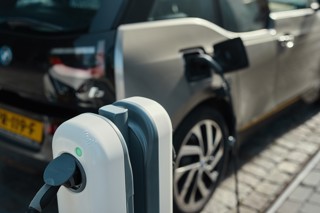The Government has cut the electric car grant from £3,000 to £2,500 and excluded models that cost more than £35,000.
It says grants will no longer be available for higher-priced vehicles, “typically bought by drivers who can afford to switch without a subsidy from taxpayers”.
The changes mean popular fleet vehicles like the Tesla Model 3 and Hyundai Kona Electric 64kWh will no longer be eligible for the grant.
Tax incentives, including favourable company car tax rates, will remain in place, however.
"There are going to be a significant number of corporate and commercial vehicles currently in the lease co. order process that will now miss out on the Government grant," David Bushnell, Alphabet (GB)
The changes are expected to allow the funding to last longer and be available for more drivers, reflecting the growth in the number of cheaper electric cars.
Transport Minister Rachel Maclean said: “We want as many people as possible to be able to make the switch to electric vehicles as we look to reduce our carbon emissions, strive towards our net-zero ambitions and level up right across the UK.
“The increasing choice of new vehicles, growing demand from customers and rapidly rising number of chargepoints mean that, while the level of funding remains as high as ever, given soaring demand, we are refocusing our vehicle grants on the more affordable zero emission vehicles – where most consumers will be looking and where taxpayers’ money will make more of a difference.
“We will continue to review the grant as the market grows."
The plug-in vehicle grant scheme was renewed last year, when plug-in hybrids and cars costing more than £50,000 were excluded. It was originally introduced in 2011 and has supported the purchase of 285,000 vehicles to date.
Mike Hawes, SMMT chief executive, believes the decision to slash the grant is the wrong move at the wrong time.
“New battery electric technology is more expensive than conventional engines and incentives are essential in making these vehicles affordable to the customer,” he said
“Cutting the grant and eligibility moves the UK even further behind other markets, markets which are increasing their support, making it yet more difficult for the UK to get sufficient supply.
"This sends the wrong message to the consumer, especially private customers, and to an industry challenged to meet the Government’s ambition to be a world leader in the transition to zero emission mobility,” Hawes added.
Plug-in van customers had been eligible for a 20% reduction on the vehicle purchase price, up to a maximum of £8,000.
The plug-in truck grant, which had provided funding of up to £20,000, has been cut by £4,000.
The new small truck grant (3.5-12 tonnes) covers 20% of the purchase price, up to a maximum of £16,000.
It will be available for the first 250 orders placed. Grants at the £16,000 rate are also limited to 10 per customer. After the 250-order limit is reached, a maximum grant rate of £6,000 will apply.
However, a new large plug-in truck grant (greater than 12 tonnes) will now offer funding of up to £25,000 – an increase of £5,000.
The eligibility has also changed meaning that to qualify all vehicles must be able to travel at least 60 miles (96km) without any emissions at all.
The British Vehicle Rental and Leasing Association (BVRLA) also criticised the timing of the decision to cut the plug-in grant.
'MAKES NO SENSE'
BVRLA chief executive Gerry Keaney said: “Given the surge in battery electric vehicle adoption, it makes sense for the Government to reconsider where and how it uses grants and incentives, but today’s move is poorly timed and will slow down the transition to zero emission motoring.
"Confidence in electric vehicles and their running costs is fragile, so slashing the grants and eligibility criteria will put a brake on the fantastic market momentum we have seen in recent months.
"This will come as a particular blow for the commercial vehicle sector, where BVRLA members have been working so hard to drive uptake of electric vans and trucks.
"Coming just months before the COP 26 summit and as other countries are increasing their zero emission subsidies, this move could also have a big impact on the supply of electric vehicles coming into the UK.”
The Association of Fleet Professionals (AFP) believes it is "too soon" to cut support for EVs.
"While we have seen massive enthusiasm growing for EVs in the fleet sector over recent months, the whole subject is still very much in its infancy and there is general agreement that the help that the grant scheme provides remains if not essential, then very important," said AFP chair Paul Hollick.
"We’re especially disappointed around the £35,000 ceiling on cars. There are a number of models that fleets are adopting in number that will be affected by this.
"The situation in the van market is even more acute. Fleet adoption of electric vans has barely begun simply because of lack of availability of models and to reduce the grants substantially, just as they are starting to enter production, is a little mystifying.
“However, the bigger point is really the lack of signposting from Government.
"We’ve been saying for some time that the 2030 EV target is very much achievable for fleets but that what we need is a clear roadmap over time, especially when it comes to the fiscal basics that affect company cars such as benefit in kind, road fund licence and, in this instance, the EV grant scheme."
Hollick says that the change in support has "come out of the blue" and doesn’t do anything to create the kind of stability that is needed for the fleet adoption of EVs.
“Particularly, the fact that all of this takes effect immediately means that orders still in progress will be affected," said Hollick.
"So a business that sent an order for an EV to their leasing company yesterday but which hasn’t yet been placed with the manufacturer will have to be requoted, which is just an unnecessary complication.”
Alphabet said it sympathised with the Government that cuts needed to be made to support the UK’s deficit.
FLEETS TO MISS OUT
However, David Bushnell, principal consultant at Alphabet (GB), told Fleet News: "The timing of this is ill-judged and does not support the push towards clean energy or the ban on sales of petrol and diesel vehicles by 2030."
Bushnell said it was "positive to hear" the benefit-in-kind (BIK) tax rates remain "generous" for company car drivers, but this latest news will make the Government’s net zero target much harder to achieve.
"By providing little advanced warning on these grant changes, the fleet industry will be immediately impacted," he added.
"Adjusting these figures at a time when decisions on company policies are being made could be potentially damaging to the fleet industry, particularly as it is responsible for the majority of the used car market.
"There are going to be a significant number of corporate and commercial vehicles currently in the lease co. order process that will now miss out on the Government grant.
"This will have cost implications for businesses across the UK, at a time when many are trying to recover from the pandemic.”
























Dave McEwen - 18/03/2021 12:07
This feels slightly counterintuitive and will have a significant impact on the number of EV's fitting within company car choice lists. Perhaps we will see the manufacturers adjusting RRP's downwards to reflect the change in legislation?